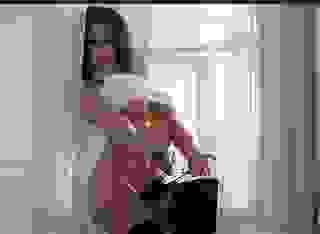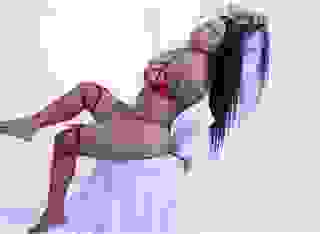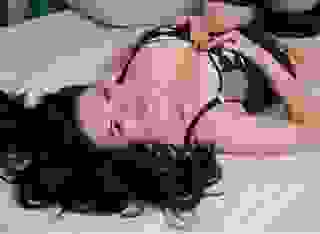Note: You can change font size, font face, and turn on dark mode by clicking the "A" icon tab in the Story Info Box.
You can temporarily switch back to a Classic Literotica® experience during our ongoing public Beta testing. Please consider leaving feedback on issues you experience or suggest improvements.
Click hereI stepped out into the chilly night air. There were no cabs waiting for pickups. There was no one anywhere, nothing moving. It felt like I had come back to a city without any people in it.
I went back into the station. There was a row of phone booths next to the doors. I checked them until I saw one that had a small sticker on it that read, A-1 Taxi Service with a phone number below it. A-1. That seemed like a good sign.
I dialed the number. There was no answer. I considered calling home and asking my Dad to come get me, but dismissed that idea immediately. I wasn't ready for them.
You know where to go, I told myself.
I found the coin operated lockers and dropped in a quarter. When it opened, I stuffed my suitcase in it, took my skates out of their case, and put that in as well. I pocketed the key and closed the door. That's when I realized I had left my jacket in the Cleveland station. I opened the locker again, fetched my Devil Dolls jersey and pulled it on over my head.
I crossed the street to Roosevelt Park. Sitting on a bench, I kicked off my shoes, then tied the laces together and draped them around my neck.
I put on my skates.
I had a persistent throbbing in the back of my right calf, and my left knee hurt like hell if I bent it too far, but she was only about three miles away.
I set out down Michigan Avenue, then made the turn on to Trumbull, past the looming dark light towers of Briggs Stadium. I felt stiff and sore at first, but loosened up along the way, and picked up speed.
I flew past the dark apartment buildings and closed stores. Since that day my father gave me my first pair of roller skates, I had lived for skating. But now I knew, I had always been skating away from something; away from my mother's hot temper and my father's cold indifference. Away from the tedium of school and suburbia. Away from facing the truth about myself; that I was different from everyone around me.
A police car was parked at the corner of Trumbull and Temple, but the cops inside ignored me. I heard a wolf whistle from the dark doorway of a small brick front bar, but I ignored that.
A few blocks further on, a garbage truck crawled along the curb. The men hanging off the back whooped and hollered at me. I waved to them, and said to myself, "Go, Kitty, go."
For the first time in my life, I was skating toward something. I was skating toward hope. I was skating toward love. I was skating to Myra.
I ached all over, exhausted in body and spirit. Dogs barked as I rolled past their yards, and I was afraid that if they chased me, I could not outrun them. My legs were growing wobbly by the time I got to West Grand Boulevard, and when I made the turn, I snagged my wheel in the grate of a storm drain. I went down on my hands and knees, scuffing my palms and tearing a hole in my blue jeans.
My hands felt like they were on fire, and both my knees throbbed, but I managed to get to my feet. I only had a few blocks to go.
The building will be locked, I thought. She won't be home. She'll be home, but she will slam the door in my face. She'll be home, but she will be with someone else.
I arrived at her building, so weary that I could barely coast. The door was not locked.
I tried to take my skates off in the lobby, but I couldn't bend my knees enough to reach them, so I rolled into the elevator and pushed the button for her floor.
On the way up, I realized that it was probably close to three o'clock by now. I didn't know if she wanted to see me or not. She had asked me so many times to come home. Perhaps she had given up. Banging on her door in the middle of the night suddenly seemed like a bad idea.
The elevator opened and I was looking at her door. I hesitated long enough that the elevator started to close and I had to push the doors back to get out.
I rolled to her door and raised my hand to knock, but stopped. Wait, I told myself. I leaned against the wall and slowly lowered myself to the floor. It hurt to pull my knees up, but I did, because I was afraid I would trip someone. I managed to get my skates off, and set them beside me.
I was so exhausted that I couldn't hold my head up. My eyes closed, and when I opened them again, someone was tapping on my shoulder.
I looked up and saw a kid, about twelve or thirteen. He was wearing a denim jacket and a Tigers cap and had a canvas bag over his shoulder.
"Are you okay, lady?" he asked.
I cleared my throat and said, "Yeah, I'm okay. I'm just waiting for my friend."
"She live here?"
"Yeah."
"I got her paper." He handed me a copy of the Free Press.
"Thanks, I'll give it to her."
"You play hockey or something?"
I realized he was pointing to my jersey.
"Roller derby," I told him.
"Wow. That's neat."
He went off down the hall, dropping a newspaper in front of each apartment. I looked at the headline. They were going to stop making Packards. My dad had been so proud of his. I wondered if it was still parked behind A-1 Manufacturing.
I heard the door open. I leaned my head back against the wall and looked up. There she was. Her green eyes, her freckles, her tousled red hair.
"Oh my god," she said, "Kitty?"
I had thought about what I would say to her a hundred times, but all I could manage was, "I got your newspaper."
I struggled to get up. She held out her hand, and like an idiot, I handed her the paper.
She tossed it on the side table next to the door, then reached down and helped me to my feet.
There we were, face to face. For a minute neither of us spoke.
"I watched your game," she said.
"What did you think?"
"I thought you were amazing. Are you going to go back?"
"No, I don't think so."
"Then what are you going to do?"
For the first time ever, standing in Myra's doorway, I could not imagine wanting to be anywhere other than where I was.
I shook my head. "I don't know." The first tear ran down my cheek. "I only know I want to be with you."
Myra grinned. "Kitty, I told you I would wait for you."
"Yeah," I said, sniffling, "But you didn't say for how long."
"Well," she said, "Not forever, but longer than this."
"I love you, Myra."
"I love you, too. So I guess you ought to come in."
She raised her arms. I stepped into them, and we held each other, as tightly as we could, for the next forty five years.
CHAPTER NINE
The A-1 Comets had struggled in their second season, and did not get a third. I felt guilty about that, but Myra tried to assure me that it wasn't my fault, at least not entirely. Early in the second season, Cora went hard into the rail and broke her collar bone, and then Angie got pregnant and had to quit. They lost their next three bouts, and her father pulled the plug on the team. I think Myra mostly blamed herself. Her heart wasn't really in it after I left for New York. Of course, that puts it right back on me, doesn't it?
I considered hooking up with another team, but let the opportunities pass. I even stopped skating for awhile. Over time, our life filled with other things, and when Carol brought in the mail a few weeks ago and read the letter to me, it was the first time I had thought about the Comets in a long time. So much had happened since those roller derby days.
I guess it's a complicated situation for any couple, getting used to each other, finding out how you fit together. In addition, of course, Myra and I had the extra problem of the kind of couple we were.
The idea that we would come out and tell everyone that we were lesbians wasn't something we even considered; not then, not in the fifties. But people weren't stupid either. My parents already knew, and they got used to the idea of Myra coming with me to Thanksgiving dinner or family birthdays. But my father always referred to her as "your friend," and my mom didn't acknowledge the reality until years later.
Myra's mother had passed away several years earlier and her father was pretty obtuse. I don't know if he ever figured it out. He didn't have much time to do so, anyway, he died of a massive heart attack on New Year's Eve, 1959, which he was celebrating in a room at the Statler Hotel with his secretary. Her husband was celebrating elsewhere, but we didn't see the need to ask any questions about that.
Everything changed after he died. Except for a few thousand dollars bequeathed to the Republican Party and to the Archdiocese of Detroit, Myra inherited everything.
I walked around in a daze for a few days, but she always knew she'd be rich one day and took it all in stride. She wasted no time in selling everything; the company, the house in Grosse Pointe, her father's car and boat. That goddamn boat was worth more than my parents' house.
She invested some of the money in stocks, and gave ten grand to the Kennedy campaign. That must have made old Dad spin in his grave.
Never having had much money, I did not handle it well at first. I spent it like a sailor on shore leave. We had a few fights over that, but we always made up, usually as soon as I admitted that she was right.
I would say that we bought our dream house soon after Myra had sold off the last of her father's assets, but that would not be right. For one thing, I'd never dreamed of having a house at all. Besides, it was Myra who bought the house. It wasn't until years later that we could legally put it in both our names. But, in any case, we moved into a large carpenter gothic house just west of Traverse City, surrounded by twenty acres of wooded grounds, high on a hill overlooking Lake Michigan.
We spent our days cooking, reading, walking in the woods or on the sand dunes. In the evening, we would sit on the porch, holding hands and watching the sun set over the lake. We had dogs and cats, and for a while, we even had a goat that wandered into the yard one day and decided to stick around.
Myra wrote her poetry and I discovered I had a knack for gardening. Before long, I had transformed wide swathes of our yard into landscaped flowerbeds, and she was submitting poems to literary magazines. She began to take it seriously, and spent more time writing. I did not feel neglected, so much as in the way.
I knew what to do. I dug out my skates. I tried skating on the local roads, but only the busy highways were paved, and it was impossible to get up a head of steam on the rough country lanes.
Myra liked to write late in the evening, so I began driving into Traverse City to skate in the parking lot at the A&P after it closed for the day. But someone called the sheriff, and I was told not to skate there anymore. For a while, I would park outside the gate at Sleeping Bear Dunes, skate in and do laps around their paved parking lot. One night, I saw a bear watching me, and that was the end of skating there. Eventually, we did the obvious thing and built an asphalt track in our yard. Nobody was handing me polish pastries or shouting "Go, Kitty, Go!" but at least I was in motion. It didn't matter that I didn't actually go anywhere. I was happy where I was.
Myra's poetry was getting better, and being accepted into more magazines. She wasn't writing about the light on the lake or the wind rustling the leaves anymore, she was writing about love. She was writing about me. About us. A publisher from Boston called Bilitis Press wrote to her. They wanted to publish a book of her poems. We went into town to celebrate with steaks at the Log Cabin Inn.
On the drive home, we talked about possible titles for the book.
"I think I've decided," Myra said. "The title is The Soft Touch of Sappho."
I felt a chill when she told me that. "Uh, that could lead to some trouble," I told her.
Myra laughed. "What are they going to do, Kitty? Not buy the book?"
I supposed she was right. We didn't have jobs we could get fired from, or a home they could boot us out of.
"Kitty," she said, suddenly serious, "If people like us don't speak up, no one else will."
The Bilitis folks loved the title, the book came out, it sold a few hundred copies, and things continued as they had. She'd write, I'd weed. We did jigsaw puzzles and danced when the Ronettes or the Shirelles came on the radio. We cooked elaborate meals in the evenings and made love late at night.
But it was the sixties, and outside of our lakeside refuge, everything was changing. When I went into Traverse City to shop, I would see young men with long hair and girls in miniskirts. Somehow, the world had become more colorful. The talk in the air was all about peace and love.
And somewhere in all that change, more people started buying Myra's little book of poems. She got letters, mostly from young women in places like Berkley, California and Madison, Wisconsin. They were all variations on the same theme; not just telling her how much they liked her poetry, but how it helped them understand themselves.
Every time another letter came, she would ask, "Can you believe it, Kitty?" And I always answered, "Of course I can." She hadn't changed anyone else's life as much as she had mine.
Bilitis wanted another book, so she collected her newer poems and titled it Alabaster On Indigo, referring to the towering white clouds we would watch dance across Lake Michigan. It sold out quickly and they did a second edition, then a third.
The publisher organized poetry readings in Chicago and Ann Arbor. In both cities, the audience was nearly all women. Most were young, but a few were much older. I was especially touched when I saw two women, who looked like they were in their sixties, holding hands while they listened to Myra recite her poems.
In Ann Arbor, the woman who hosted the event introduced her as "Myra O'Conner, Michigan's renowned gay poetess." Gay. That was a new meaning of that word to me. Driving home, I asked Myra, "How many lesbians do you think there are in the world?"
"I have no idea."
"Well," I said, "It seems like a hell of a lot more than I thought there were."
Women's liberation. Gay rights. It seemed like everything had become political, and Myra threw herself right into it. She began writing essays along with her poetry, and was invited to speak at events. We marched in Detroit and Lansing, and even in Washington D.C. I wasn't much of a people person, but I found that if I wore my skates, the crowds were more tolerable.
Eventually, life settled down again. It seemed like everyone was just exhausted. Things were different at the lake house, though. It had become the center of a social circle of writers, artists and activists. We had so many visitors that we built a guest house to accommodate them.
There was a different kind of visitor as well. Every now and then a teenage runaway or a woman fleeing an abusive relationship would turn up on our porch. We tried to help them all, with referrals or travel money or just a safe place to stay for a few days.
In those days, we could not adopt children, but instead we "took in strays," as Myra put it. I would joke that I had been the first. Some would stay for months. Some came and went many times over the years.
Carol showed up on a winter morning when the cold wind off the lake felt like it could cut you open. I brought her in and made her hot tea and listened to her tell her too familiar story of abuse and escape. When Myra came downstairs, we made breakfast, then took her out to the guest house and told her that she was welcome to stay as long as she wanted.
She had arrived just in time, and she stayed through the bad years, and ever since.
Myra had just published her fourth book of poetry, and the publisher had shipped her a hundred copies to sign. She was working in her office upstairs and called down to me.
"Kitty, I need some help."
I could hear distress in her voice. I rushed to her. She was sitting at her desk, cradling her right hand in her lap.
"What the matter, honey?" I asked.
She looked up at me with a frightened expression. "My hand won't stop shaking," she said, "I think I might be having a stroke."
Carol was in the kitchen, preparing lunch. I shouted for her to call an ambulance. Then I took Myra in my arms. I put my hand on hers and felt it trembling.
"You'll be alright," I told her, "Help is on the way."
I held her until the ambulance arrived. The paramedics checked her out and did not seem to think she was in any danger, but they helped her downstairs and put her in the ambulance. I followed them to Munson Hospital in Traverse City.
She had not had a stroke. It took weeks of tests before we found out what was wrong with her.
Parkinson's disease. Those words still fill me with equal parts sorrow and anger. The doctor's tried to put a positive spin on the situation. There was no cure, they said, but the symptoms could be treated. Eventually, though, we both knew that it would be a losing fight.
For months, she was depressed and apathetic. When spring came, she brightened and, on the surface, everything seemed almost normal for the next few years. But I paid attention. I noticed that, over time, she walked slower and didn't sleep as much. She only wrote sporadically, and without much to show for it.
That's what scared me the most. I could deal with her physical decline. I was ready to feed her, to carry her on my back, to wipe her ass for the rest of her life. But I did not know how I could cope with losing her voice and her mind.
It was Carol who had the idea. "Muhammed Ali," she said to me.
"What about him?"
"He has Parkinsons."
So I wrote a letter to Muhammed Ali. I admit, I smiled a bit as I did it, remembering how much my father had hated him. I told him about Myra, about her poetry, about how, like him, she had given much of her life to taking up the cause of the dispossessed and despised, and how, like him, she had been stricken with Parkinsons.
A few weeks went by and I had more or less forgotten about it, when a reply arrived. He had written Myra a three page typed letter. He wrote about her poetry in a manner that indicated he had actually read it, citing particular passages for comments. And he offered her his advice on dealing with their shared condition.
Myra read it, and wept. The next morning, she spent hours at her desk, writing. At lunchtime, she came downstairs and handed me a letter she had written back to Ali, and asked me to mail it for her. After we ate, she went back to her office and wrote more, until her hands gave out.
They corresponded for the next few years, and Myra seemed almost her old self. But slowly, her physical deterioration continued. She took to using a cane, then a walker. Eventually, she could not climb the stairs anymore. We installed a hospital bed in the parlor, and for the first time in decades, we slept apart.
When her hands became useless, she dictated her poems to me or to Carol. They all dealt with her decline and her mortality, but they were filled with courage and optimism. Clearly, they were inspired by her correspondence with Ali. When it was finished, she titled the collection "The Champion of the World." It was months later when I realized that she had known more than one champion in her life.
When summer ended, it seemed like she faded with the autumn leaves. She was hospitalized twice with pneumonia. It became difficult for her to speak, but she managed to tell me she did not want to go to the hospital again.
When I knew that the time would come soon, I took to sleeping in a reclining chair next to her bed. On the last morning, I woke up and heard her struggling to breathe. I got on the bed next to her and took her in my arms. The sun came through the window and illuminated her face just before she took her last breath. I don't know if she knew that I was holding her, but I tell myself that she did.
The day of her memorial service began with a brief snow shower, but the sky grew bright and blue as the morning went on. More than three hundred people gathered on our lawn and in the garden. Muhammed Ali, not long for the world himself, sent a beautiful wreath. One after another, women came forward from the crowd and read passages from her poems.








